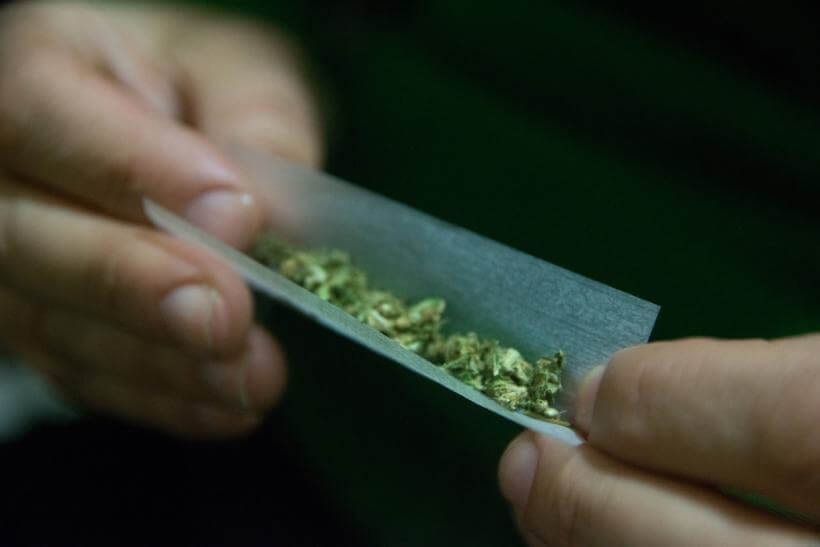While the danger of smoking tobacco and inhaling second-hand tobacco smoke has been proven and doesn’t generate any doubts, the issue of smoking marijuana remains very controversial. Everyone knows that smoking tobacco cigarettes leads to heart disease and stroke, bladder cancer, lung cancer, liver cancer, pancreatic cancer, as well as to a wide range of other chronic illnesses.
Some consequences of marijuana use remain unknown. Quite often, people who quit smoking tobacco for health reasons start wondering whether smoking weed can cause cancer as well. Let’s figure it out together.
Tobacco Smoke Vs. Marijuana Smoke
Tobacco smoke is a mixture of chemicals that cause major chronic illnesses and cancer. The tobacco industry is adding most of these chemicals. People keep smoking, even though the fact that over 80% of all lung cancer cases are connected to tobacco use. The chemicals, found in tobacco smoke, prevent oxygen from normally circulating in the blood.
 Also, tobacco smoke can change the lung structure and the structure of other tissues, which often leads to allergies, asthmas, cancers, cardiovascular disease, allergies, chronic obstructive pulmonary disease, emphysema, glaucoma, stroke, SIDS, and other health complications.
Also, tobacco smoke can change the lung structure and the structure of other tissues, which often leads to allergies, asthmas, cancers, cardiovascular disease, allergies, chronic obstructive pulmonary disease, emphysema, glaucoma, stroke, SIDS, and other health complications.
 When it comes to marijuana smoke, it contains some chemicals as well. They are released as a result of heating the dry herb, the paper it is wrapped into, and other accessories that are exposed to the heat. However, studies have proven that smoking tobacco is much more dangerous than smoking marijuana.
When it comes to marijuana smoke, it contains some chemicals as well. They are released as a result of heating the dry herb, the paper it is wrapped into, and other accessories that are exposed to the heat. However, studies have proven that smoking tobacco is much more dangerous than smoking marijuana.
Does Smoking Weed Cause Cancer?
If we compare cigarette smokers with marijuana smokers, most of the latter will smoke less on a daily basis compared to the former. A heavy tobacco smoker can smoke from twenty to forty cigarettes a day, whereas a weed smoker is likely to smoke once or twice a day for recreational purposes.
People who smoke marijuana for pain management and other medical concerns may consume more marijuana smoke, but they are very unlikely to inhale the same amount of smoke as a heavy tobacco smoker does.
Does marijuana cause cancer when heated and smoked? The truth is, any kind of smoke is not good for your lungs, be it the smoke from the burnt leaves on a farm, smoke from a barbecue, marijuana smoke or tobacco smoke. Human lungs are made to inhale clean air, and anything apart from that may lead to irritation, allergies, and other health complications.
According to some studies, regular marijuana smoke intake leads to the airway injuries that one can observe under the microscope. Also, some reports indicate that smoking marijuana intensifies respiratory symptoms like shortness of breath, coughing, and wheezing.
 There are reports suggesting that regular marijuana consumption does not lead to any significant changes in lung function, and does not increase the risk of COPD.
There are reports suggesting that regular marijuana consumption does not lead to any significant changes in lung function, and does not increase the risk of COPD.
Currently, scientists are trying to determine whether marijuana smoking leads to the same adverse health effects as tobacco smoking. The fact that the health risks are lower shouldn’t trick you into thinking that you are safe. When you smoke marijuana, even in small quantities every once and again, you still expose your lungs to smoke, tar, and carcinogens that are released during the combustion process.
There is one aspect of smoking weed that differs from smoking regular cigarettes. When one smokes marijuana, they usually hold their breath for a few seconds for stronger effect. According to the American Lung Association, it increases a person’s exposure to smoke, tar, and other chemicals.
Scientists discovered some other facts about smoking marijuana that raise concerns. Occasional marijuana use leads to such side-effects of the “high” as clouded thinking, disorientation, and slow reaction. Sometimes marijuana consumption leads to depressive episodes and anxiety. According to the research, frequent marijuana use may have an adverse effect on a person’s IQ level and mental functioning.
When a smoker doesn’t need to refrain from operating a vehicle after a cigarette, a marijuana consumer should not operate any vehicles as long as they are under the influence.
And the last, but not least. Recreational marijuana is illegal in most states and countries of the world. You can only get medical marijuana in some states, provided that you have a doctor ’s for it.
Does Weed Cause Cancer or Heal It?
Does weed cause cancer or heal it? Many people are confused since they have heard of reports claiming that cannabis can cure cancer. Unfortunately, the currently available data does not prove that cannabis cures cancer. Even though it may serve as a pain management medication, it is not a cure as of now.
If marijuana is consumed in the same way as tobacco, can it cause the same adverse health effects? Even though there are different ingredients in pot and tobacco smoke, there is one common ingredient, benzpyrene. It is a cancer-causing agent that attacks people with a certain genetic marker. So even if weed doesn’t cause cancer in all the people, it is proven to do so in some.
Can you get lung cancer from smoking weed and cigarettes? Unfortunately, you can. Marijuana increases the risk of cancer in heavy smokers and drinkers. It aggravates the damage that smoking and drinking do to the liver and lungs of the user.
One study revealed that male marijuana smokers who also smoked tobacco had the twice as high risk of lung cancer compared to men who consumed only tobacco. There was one more study claiming that prolonged marijuana use leads to an increased risk of lung cancer in adults under fifty-five years old. The study also claims that the risk increases in direct proportion to the amount of marijuana consumption.
 However, a large study, conducted internationally in 2015, reveals that there is little association between regular long-term cannabis consumption and lung cancer. Not so long ago this year, the Journal of Thoracic Oncology published a study report revealing that marijuana can help to control symptoms in cancer patients.
However, a large study, conducted internationally in 2015, reveals that there is little association between regular long-term cannabis consumption and lung cancer. Not so long ago this year, the Journal of Thoracic Oncology published a study report revealing that marijuana can help to control symptoms in cancer patients.
This very study points out that the small size and quality of available studies on lung cancer and marijuana smoking make it hard to reach any firm conclusions now.
Marijuana in Cancer Patients
There is a reverse of a coin when it comes to marijuana and cancer. There are some concerns regarding the potential risk of cancer in regular marijuana smokers, and there is also a potential benefit of smoking marijuana in cancer patients.
The National Cancer Institute points out that cannabinoids can have benefits in treating the side-effects of cancer. Such side-effects as loss of appetite, nausea, pain, and sleep disorders may improve thanks to cannabis consumption. For this reason, the use of cannabinoids in cancer patients needs to be researched further.
Is Secondhand Marijuana Smoke Safe?
Most people know that secondhand tobacco smoke poses a significant threat to human health, not much less than actual smoking. Is inhaling secondhand marijuana smoke as dangerous? Some studies point out that marijuana smoke raises as many concerns as tobacco smoke. Unfortunately, the limited amount of studies prevents us from issuing any verdict to secondhand cannabis smoking.
Final Thoughts
According to the currently available data, there is no proof that smoking marijuana will cause cancer in every person who tries it. Some studies attempt to prove it while others contradict it. In any case, the available information is not enough to claim anything for sure. In the meanwhile, one thing is for sure – there is an increased potential risk of cancer in marijuana smokers.
 More comprehensive research is needed to determine precisely and unbiasedly whether marijuana can cause cancer. For now, the answer is “maybe”. Luckily, you can consume your medical cannabis in a number of ways that don’t require inhaling smoke. One of the best ways to deliver cannabidiol to your system is to use a dry herb, concentrate or wax vaporizer.
More comprehensive research is needed to determine precisely and unbiasedly whether marijuana can cause cancer. For now, the answer is “maybe”. Luckily, you can consume your medical cannabis in a number of ways that don’t require inhaling smoke. One of the best ways to deliver cannabidiol to your system is to use a dry herb, concentrate or wax vaporizer.
With the help of these devices, you will inhale the vapor with the needed substances without any tar or other combustion residues. You can get edibles so that you don’t have to inhale any smoke or vapor at all.[/vc_column_text][/vc_column][/vc_row]


0 Comments